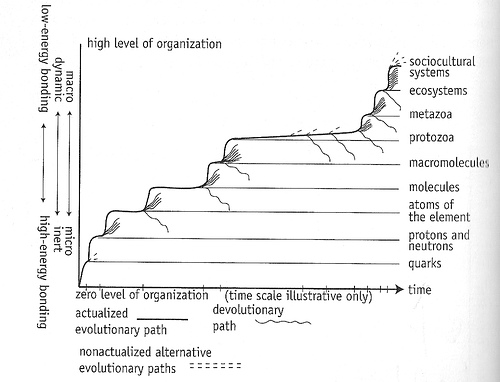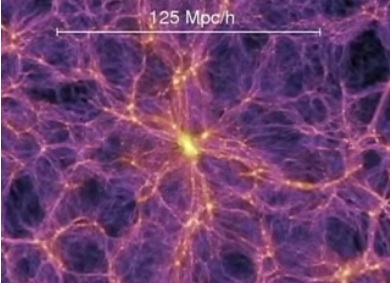Networks
Convergence
As readers of my blog posts know, I talk a lot about evolutionary systems, the formal structure of cooperation, the role of both in emergence of new levels of complexity, and I sometimes use cellular automata to make points about all these things and the reification of useful models (here’s a summary of how they all relate). I’ve also touched on this “thing” going on with the system of life on Earth that is related to technological singularity but really is the emergence or (or convergence) of an entirely new form of intelligence/life/collective consciousness/cultural agency, above the level of human existence.

From The Chaos Point. Reproduced with permission from the author.
In a convergence of a different sort, many of these threads which all come together and interrelate in my own mind, came together in various conversations and talks within the last 15 hours. And while it’s impossible to explain this all in details, it’s really exciting to find other people who are on …
Cancer as a Complex Adaptive System
Heng, et al recently published a review paper that brings together and touches on many different aspects of cancer complexity. I thought this an opportunity to selectively quote the paper and organize the quotes loosely around various complex systems concepts they relate to. I’m curious whether this makes sense to readers of this blog, or whether there’s too much unexplained jargon and too many large conceptual leaps. Please ask questions or make comments freely below.
One preface I think will help is to understand that genome, karyotype and chromosome refer roughly to the same thing. Here are several schematics that I will present without explanation that together illustrate how genes relate to genome/karyotype/chromosome structure, and how that in turn relates to the so-called genetic network (loosely equivalent to the “proteome”). Of course “gene” is an outdated and inaccurate concept, so don’t get too hung up looking for genes here, just understand that they are sub-structural elements of the genome.
From MSU website
Alfred Hubler on Stabilizing CAS
With his permission, I am posting an email thread between myself and Alfred Hubler. I had contacted him on the recommendation of John Miller when Kevin and I were posting on the possibility of dampening boom-bust cycles in the financial markets through policy or other mechanisms. Here’s what Hubler had to say:…
The Vanguard of Science: Bonnie Bassler
The import of this talk goes way beyond the specific and stunning work that Bassler and her team have done on quorum sensing. In my mind, this is the prototype for good biological science:…
Too Big to Fail = Too Big to Exist?
I asked this question on twitter/facebook and got a lot of variants of “I agree” and only one person who stated disagreement (but provided inadequate reason, IMO). Jay Greenspan put it this way:
Interesting question this morning, and something I’ve been wondering about. I’ve yet to see anyone really argue that state of non-regulation we’ve been in for the last years has been a good idea. I’ve heard some thoughtful conservatives talk about how their views have changed radically — coming to understand that forceful regulation is absolutely necessary.
The super-conservatives I’ve seen are talking more about taxes, avoiding the subject. I’d be very interested to see a credible argument for a hands-off approach.
So how about it, anyone game to take up a considered argument for not mandating that companies who get big enough to affect the global economy should be broken up or otherwise handicapped?…
TED Talk: Linked Data
One of my favorite talks of TED 2009 was from Tim Berners-Lee, the man often credited with (actually) inventing the Web. He’s been going on for quite a while about the coming of the “semantic web” and how it will be even bigger than the current web in terms of impact. But until his TED talk on linked data, I didn’t really get it. Now I do. And I think he’s right:…
Superfoo
Response to Superorganism as Terminology.
I was actually about to post something about terminology, so I’m glad this came up. It’s just so difficult to choose words to describe concepts that have little precedent, without going to the extreme of overloading on the one end (e.g. “organism”) or the other extreme of being totally meaningless (e.g. “foo”). I have tried to use terms that are the closest in meaning to what I’m after but there’s no avoiding the misinterpretation. I can only hope by defining and redefining to an audience that is not quick to make snap judgments but rather considers the word usage in context, we can converge to at least a common understanding of what I am claiming. From there at least we have a shot at real communication of ideas and hopefully even agreement.…
Response to "Superorganism Considered Harmful"
This is a response to Kevin’s post responding to my post.
…Rafe makes an analogy to cells within a multicellular organism. How does this support the assertion that there will only be one superorganism and that we will need to subjugate our needs to its own? Obviously, there are many multicellular organisms. Certainly, there are many single-celled organisms that exist outside of multicelluar control today. So where is the evidence that there will be only one and that people won’t be able to opt out in a meaningful sense?
The Emergent Universe
In a previous post I asked what you thought this was:
Here is the same system at different resolutions (lowest to highest):…
What is a Gene?
Not having had any serious biological training I have to go to Wikipedia and Google to learn the basics. And I’m often surprised to find that concepts everyone uses don’t have good consensus amongst scientists. When reading the Wikipedia entry for “gene”, it occurs to me that if the concept didn’t predate the discovery of DNA, it would not exist.…
Seeing Sigmoids
One of the most basic but misleading heuristics that the human mind uses is that of linearity. If we see a progression (say 0, 1, 2), our first instinct is that the next step follows linearly (namely 3). But there is no a priori reason to prefer the linear interpretation to any other, say quadratic (which would suggest the next step in the sequence is 4). For whatever reason – probably due to the relative simplicity of linearity – our brains seem wired to prefer linear explanations to non-linear.…
Book Report: Complex Adaptive Systems
I just finished reading Complex Adaptive Systems and thought I’d share some of the stuff I underlined and point out how it relates to certain themes and claims in this blog. The organization of these quotes is my own, not related to the chapter or section headings of the book necessarily.…
On the Brink of True Distributed Computing
[ The following is a repost from my MySpace blog, which is not accessible unless you have an account there. Also, the audience there isn’t really interested in this stuff :-) ]
The notion that the “network is the computer” - or at least that it could be - has been around for a while. But all actual implementations to date are either too specialized (e.g. SETI@home) or simplistic (e.g. p2p file-sharing, viruses, DDoS attacks) to be used for generalized computation, or are bound at some critical bottleneck of centralization. To this latter point, search engines hold promise, but the ones we are familiar with like Google are reliant on both central computational control (for web crawling and result retrieval) and central storage (for indexing and result caching). Lately social bookmarking/tagging has been used by those opting in to distribute the role of crawling, retrieval and indexing. It remains to be seen whether keyword tags and clusters thereof are semantically strong enough in practical terms …
Management 2.0
There is a movement afoot in the business world that parallels the growing maturity of the internet and Web 2.0. Let’s call it Management 2.0. Google is a famous example at the vanguard, notable not so much for its management innovation per se — many companies are just as innovative when it comes to management — but rather for its rapid growth, global mindshare and financial success. A Harvard Business Review issue in the winter of 2006 claimed that management innovation — not technological innovation — is now the key driver of economic value worldwide. To be sure, management innovation is enabled by new technologies, especially those involving the internet and communication. Following are some of the concepts of Management 2.0, you are encouraged to complete and refine this list.…
Networks
One useful model of how information flows between elements of a level is the mathematical abstraction of a graph, more plainly known as a network. The internet is our current exemplar, but most levels of organization are amenable to network modelling of information flow: social networks, biochemical pathways, molecular latices (aka crystals), etc. The basic components of a network are nodes (i.e. the elements/agents of the level of choice in the previous post) and links from one node to another. The links in our abstract model define which nodes can pass messages to (aka share information with) which other nodes. If we wish to have a complete understanding of information flow using network modeling, there has to be a link between every pair of nodes/agents that might interact in some way.*…
